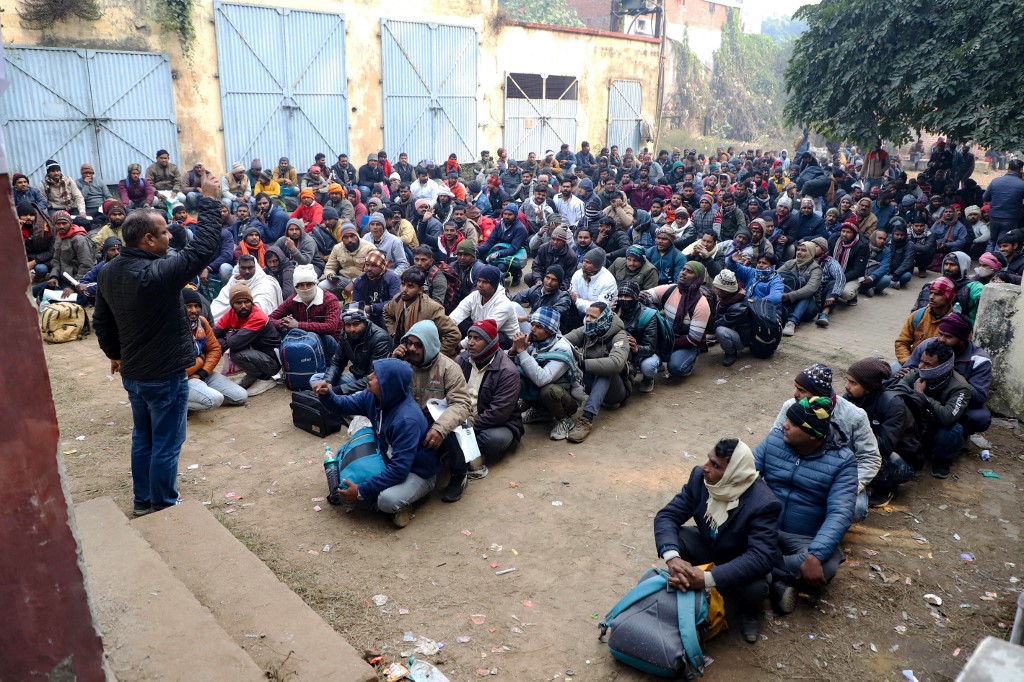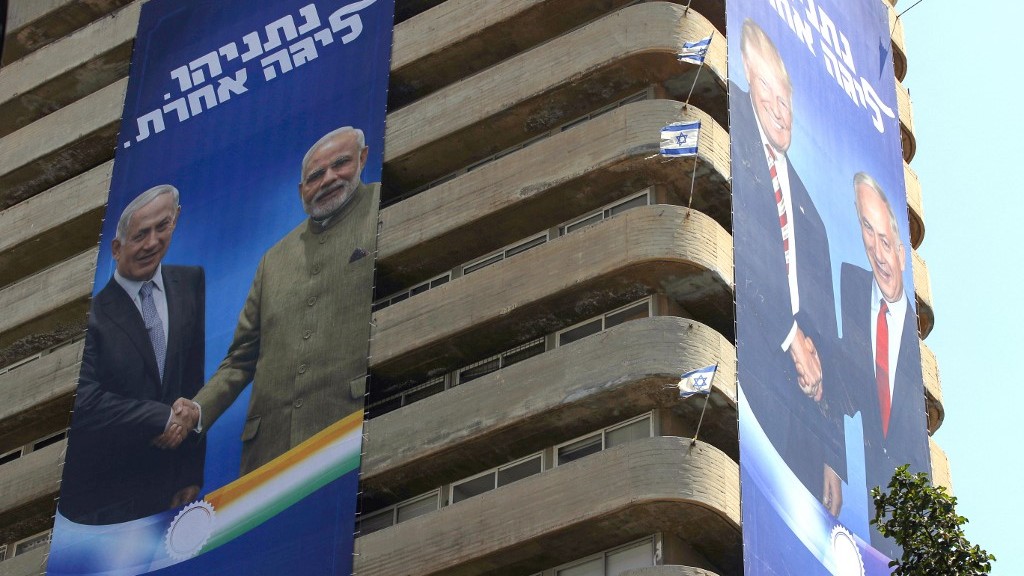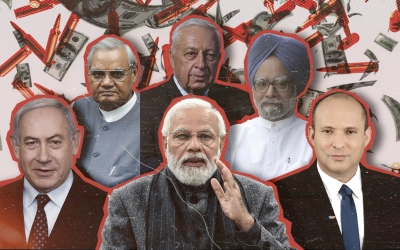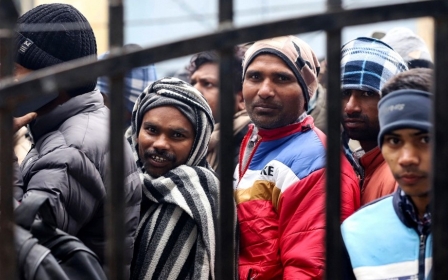War on Gaza: Indian-made Israeli 'killer' drones set to make their way to Gaza

The Israeli army is set to include Indian-made Hermes 900 drones in its expanding fleet of unmanned aerial vehicles (UAV), in a move human rights activists and defence analysts say will further implicate India in Israel's war on Gaza.
The Indian news channel TV9 Hindi reported on 7 February that the drones, manufactured in the south-central Indian city of Hyderabad, would help fulfil "Israel's needs in the Israel-Hamas war."
The delivery of the Hermes 900 drones comes as Israeli air strikes pummel Rafah and Palestinians brace for a major offensive on the densely crowded urban area.
Defence analysts say that drones have been one of the mainstays of the Israeli military during its ongoing assault on Gaza where they are used for intelligence as well as to carry out attacks on Palestinian civilians and homes.
Israel and the United States have both deployed drones over the war-battered enclave, either for surveillance purposes or to carry out operations against alleged Hamas targets.
Stay informed with MEE's newsletters
Sign up to get the latest alerts, insights and analysis, starting with Turkey Unpacked
The Hermes 900 drones, capable of remaining airborne for more than 30 hours and usually used for a variety of military operations, including reconnaissance missions as well as aerial bombardments, were first introduced in 2014 during Israel's war in Gaza in which 2,000 Palestinians were killed and 10,000 others were injured.
The drone, also known as the Hermes 900 Kochav or Star, has since come to represent the gold standard in the "medium-range long endurance" class of drones. It is one of the four lethal or "killer" drones that Israel employs.
"The Hermes 900 has a documented history of use in the region, and Israel consistently utilises its various military assets in both surveillance and targeted strikes within Gaza," Girish Linganna, a defence analyst in India, told Middle East Eye.
"Regrettably, it's highly likely that drones manufactured through the Adani-Elbit venture may be deployed in Gaza," Linganna added.
'Instead of siding with Israel's genocide and its enabling of western powers, India should take inspiration from South Africa's global-south leadership'
- Shir Hever, Palestinian BDS National Committee
On 2 February, Shephard Media reported that Israel had taken delivery of 20 Indian-made Hermes 900 drones from Adani-Elbit Advanced Systems India Ltd, a joint venture between India’s Adani Defence and Aerospace and Israel’s Elbit Systems.
Though neither country has publicly acknowledged the transfer of Indian-made drones to Israel, a source at Adani confirmed to The Wire that drones were, in fact, exported to Israel.
None of the reports, however, clarified when the drones were actually delivered to Israel.
MEE reached out to the journalist who broke the story but did not receive clarification by the time of publication.
The Israeli military referred MEE's questions to the Department of Defence and it did not reply to MEE's request for comment by the time of publication.
Complicity
Human rights activists and defence analysts say that the drone deal underlines India's growing complicity in Israel's treatment of the Palestinians and highlights the burgeoning economic and military ties between the two countries.
Shir Hever, the military embargo coordinator for the Palestinian BDS National Committee, called India's closeness to Israel during this moment "shameful", given India's long history under colonial rule.
"Hermes 900 drones are used to bomb defenceless civilians in the Gaza Strip and the West Bank," Hever, also the author of The privatisation of Israeli security, told MEE.
"As Israel refuses to abide by the ICJ decision to refrain from actions under Article 2 of the Convention to prevent Genocide, third states such as India have the responsibility to enforce an arms embargo and not be complicit in the genocide," Hever added.
Hever noted that since the ICJ ruling, two Japanese arms companies have ended their MoUs with Elbit Systems, Israel's largest weapons manufacturer. Meanwhile, on 5 February, a Dutch high court banned the Netherlands from continuing its export of F-35 parts to Israel, given the context in Gaza.
"This moment is a test of the international law system, and instead of siding with Israel's genocide and its enabling of western powers, India should take inspiration from South Africa's global-south leadership and end its complicity with genocide," Hever said.
Linganna, the defence analyst, said the India-Israel drone partnership was likely to raise several legal and ethical quandaries for India, as more information came to light about current events in Gaza.
For instance, in the years following Israel's operation in Gaza in 2014, the Al Mezan Center for Human Rights concluded that around 37 percent of Palestinians killed were due to Israeli drones.
"When India supplies drones to Israel, it becomes indirectly linked to any actions those drones take in Gaza. This blurs the line between supplier and potential accomplice, even if India has no direct control over how the drones are used," Linganna said.
India's Ministry of External Affairs did not reply to MEE's request for comment.
Activists said that while the Indian foreign ministry has tried to portray its foreign policy towards Israel and Palestine as unchanged, its actions suggested it fully supported Israel's plans for Gaza.
Indian Prime Minister Narendra Modi was among the first leaders to unequivocally condemn the Hamas-led 7 October attack on southern Israel, and his administration was subsequently slow to join the global call for a ceasefire.
New Delhi abstained from the first vote at the UN General Assembly and signed the resolution only in December.
Following an application by the South African government to the International Court of Justice (ICJ) on the charge of genocide against Israel, the Indian government steered clear from supporting the case.
The ICJ issued a preliminary ruling on 26 January, affirming a “plausible” risk that Israel is committing genocide in the Gaza Strip, and India has still refused to back the investigation.
Double standards
Noted Indian writer and activist Achin Vanaik told MEE that India's position should not be a surprise.
"As it is, the official Indian response to the latest ICJ provisional ruling is that the Indian government has taken "note" of it, while it has expressed "deep concern" about the allegations by Israel of there being Hamas members of the Unrwa who were dismissed prior to any investigation," Vanaik said.
Likewise, Antony Loewenstein, the independent journalist and author of The Palestine Laboratory, told MEE that the prospect of Israel using Indian-made weapons in Gaza was "shocking yet unsurprising", given the warming of ties between India and Israel over the past decade.
"This alliance between India-Israel has received far too little international attention, but it's vital we examine it more because Israel is essentially being assisted in its genocide in Gaza by the so-called world's largest democracy.
"I think we have to look closer at the defence ties between the two countries. I also think it's important to name and shame the Indian officials and companies that are building these drones," Loewenstein, who was based in occupied East Jerusalem between 2016 and 2020, added.
Under Modi's leadership, India has grown considerably closer to Israel. New Delhi is the largest purchaser of Israeli weapons, amounting to more than $1bn per year. Between 2015-2019, Indian purchases of Israeli weapons increased by 175 percent.
But Indian and Israeli companies have also started producing weapons in factories across India.
The bouquet of weapons being co-produced by the two countries includes Tavor X95 assault rifles, the Galil sniper rifles, Negev light machine guns, as well as Hermes 900 medium altitude long endurance drones.
Defence analysts say the partnership with India could assist in the mass production of Israeli weapons.
Meanwhile, Modi has used his relationship with Israel to modernise India's army as well as bolster his image as a champion of indigenising production and manufacturing, known as his "Make in India" programme.
The Adani-Elbit facility in Hyderabad, India, was inaugurated in 2018 in the presence of the Home Minister of Telangana, Mohammad Mahmood Ali, as well as CEO of Adani Ports, Pranav Adani, and Bezhalel Machlis, the president and chief executive officer of Elbit Systems.
The facility is touted as being India's first private UAV manufacturing complex and the only Hermes 900 production facility outside Israel.
At the opening of the plant, Ashish Rajvanshi, head of defence and aerospace at Adani, said the company aimed "to make India self-reliant in defense and aerospace systems and not depend on the US, Europe, Russia or any other nation".
Likewise, in 2020, Elad Aharonson, executive vice president and general manager of a division within Elbit Systems, said that the relationship with Adani has shaped a vision to make "India a global hub for manufacturing and exports of the unmanned platforms".
Indian tycoon Gautam Adani is involved in several ventures with Israeli companies. In early 2023, Adani Ports purchased a majority stake in Haifa Port in Israel.
Linganna, the defence analyst, said that it appeared that India was battling to balance its business interests and its own ideals with the realities of global power dynamics.
"India prides itself on a foreign policy emphasising peace and humanitarian principles. Supplying weapons that could be used in a conflict where civilian casualties are a concern creates a tension with those values," Linganna added.
This article is available in French on Middle East Eye French edition.
Middle East Eye delivers independent and unrivalled coverage and analysis of the Middle East, North Africa and beyond. To learn more about republishing this content and the associated fees, please fill out this form. More about MEE can be found here.







